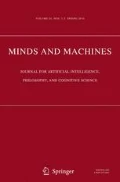Abstract
In Darwin’s Dangerous Idea, Daniel Dennett claims that evolution is algorithmic. On Dennett’s analysis, evolutionary processes are trivially algorithmic because he assumes that all natural processes are algorithmic. I will argue that there are more robust ways to understand algorithmic processes that make the claim that evolution is algorithmic empirical and not conceptual. While laws of nature can be seen as compression algorithms of information about the world, it does not follow logically that they are implemented as algorithms by physical processes. For that to be true, the processes have to be part of computational systems. The basic difference between mere simulation and real computing is having proper causal structure. I will show what kind of requirements this poses for natural evolutionary processes if they are to be computational.
Similar content being viewed by others
References
Ahouse, J. C. (1998). The Tragedy of a priori selectionism: Dennett and Gould on adaptationism. Biology and Philosophy, 13, 359–391.
Brandon, R. (1998). The Levels of selection: A hierarchy of interactors. In D. Hull & M. Ruse (Eds.), The philosophy of biology (pp. 176–197). Oxford: Oxford University Press.
Chaitin, G. J. (1975). Randomness and mathematical proof. Scientific American, 232(5), 47–52.
Crutchfield, J. P. & Mitchell, M. (1995). The evolution of emergent computation. Proceedings of the National Academy of Sciences, USA 92: (23), 10742–10746.
Cummins, R. (1975). Functional analysis. The Journal of Philosophy, 72(20), 741–765.
Dennett, D. (1995). Darwin’s dangerous idea: Evolution and the meanings of life. Nowy Jork: Simon & Schuster.
Eigen, M. (1992). Steps toward life: A perspective on evolution. Oxford: Oxford University Press.
Fodor, J. (1996). Deconstructing dennett’s Darwin. Mind and Language, 11(3), 246–262.
Gould, S. J. (1997). “Evolution: The pleasures of pluralism,” The New York Review of Books, (pp. 47–52).
Grey, C. P., & Keck, W. (1999). Bacterial targets and antibiotics: Genome-based drug discovery. Cellular and Molecular Life Sciences, 56, 779–787.
Keane, A. J. & Petruzzelli, N. (2000). Aircraft wing design using GA-based multi-level strategies, in Proceedings of the 8th AIAA/USAF/NASSA/ISSMO Symposium on Multidisciplinary analysis and optimization, pp. A00-40171 AIAA-2000-4937, Long Beach, A.I.A.A.
Krohs, U. (2004). Eine theorie biologischer theorien. Berlin: Springer.
Mahner, M., & Bunge, M. (2001). Function and functionalism: A synthetic perspective. Philosophy of Science, 68(1), 75–94.
Mayr, E. (1997). This is biology. The science of the living world. Cambridge, USA: Belknap Press.
Michalewicz, Z. (1996). Genetic algorithms + data structures = evolution programs. New York: Springer.
Miłkowski, M. (2007). Is computationalism trivial?, In G. Dodig-Crnkovic & S. Stuart (Eds.), Computation, information, cognition—the nexus and the liminal. (pp. 236–246). Cambridge Scholars Publishing.
Millikan, R. G. (1984). Language thought, and other biological categories. New foundations for realism,. Cambridge, MA: MIT Press.
Piccinini, G. (2007). Computational modelling vs. computational explanation. The Australasian Journal of Philosophy, 85(1), 93–115.
Putnam, H. (1987). Representation and reality. Cambridge, MA: MIT Press.
Scheutz, M. (2001). Computational versus causal complexity. Minds and Machines, 11, 543–566.
Scheutz, M. (2002). Philosophical issues about computation. In encyclopedia of cognitive science. London, UK: MacMillan.
Searle, J. (1992). Rediscovery of mind. Cambridge (Mass): MIT Press.
Wright, L. (1973). Functions. The Philosophical Review, 82(2), 139–168.
Author information
Authors and Affiliations
Corresponding author
Rights and permissions
About this article
Cite this article
Miłkowski, M. Is Evolution Algorithmic?. Minds & Machines 19, 465–475 (2009). https://doi.org/10.1007/s11023-009-9170-6
Published:
Issue Date:
DOI: https://doi.org/10.1007/s11023-009-9170-6




